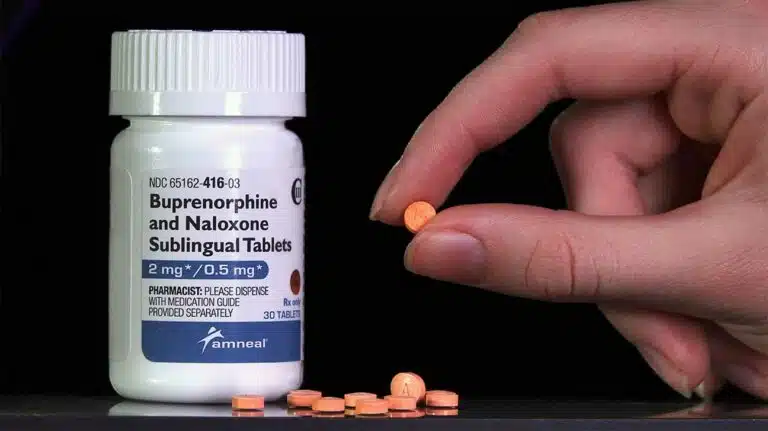Zubsolv | Uses, Dosage, Effects, & Abuse Potential

The combination of buprenorphine and naloxone (Zubsolv) is used to help treat those struggling with opioid abuse. Buprenorphine is an opioid partial agonist-antagonist and naloxone is an opioid antagonist.
Together, these combine to be a buprenorphine/naloxone sublingual tablet prescription drug which can be taken for the treatment of opioid dependence.
In addition to the Zubsolv tablet, a similar medication known as Suboxone (offered as a sublingual film) can be taken. The National Institute on Drug Abuse (NIDA) states both medications can be effective in helping with the treatment of opioid use disorder.
Zubsolv Uses
The effects of opioids can be dangerous when abused, creating life-threatening health problems such as severe sedation and respiratory depression. Zubsolv helps to ease opioid withdrawal symptoms, including those from opioid withdrawal syndrome.
In addition to easing withdrawal symptoms, Zubsolv can be used as part of an addiction treatment plan. With specific maintenance treatment, Zubsolv can be helpful for those struggling with opioid addiction.
Zubsolv Dosage
Opioids act as a central nervous system (CNS) depressant, which requires medications such as Zubsolv to assist in treating certain symptoms. Follow the prescribing information given to you by your healthcare provider when taking Zubsolv.
Depending on the severity of the withdrawal symptoms a person experiences, the dose of Zubsolv a person receives can vary. According to the medication guide, the recommended daily dose is 11.4 mg.
Side Effects Of Zubsolv
Despite the benefits of Zubsolv, the medication may cause possible side effects. The United States Food and Drug Administration (FDA) states some of these side effects can include:
- nausea
- sleepiness
- constipation
- headache
- pain
- sweating
- drowsiness
- sleeping difficulties
- dizziness
- vomiting
- dental problems
Despite the positive aspect of this FDA approved medication, other side effects may take place. For instance, contact your doctor immediately if you experience liver problems.
Liver function may be impacted by this medication which can lead to urine abnormalities or a loss of appetite.
Medical Conditions
Life-threatening side effects may take place in those who have certain medical conditions or health problems. For instance, if you have any of these conditions, contact your healthcare representative and consult their medical advice right away:
- gallbladder problems
- chronic obstructive pulmonary disease (COPD) or any illness which causes breathing problems
- head injury
- problems with your adrenal gland or Addison’s disease
- difficulty urinating
In addition to these medical conditions, women who are breastfeeding should avoid opioids and speak with their doctor right away before taking Zubsolv as the drug may pass from the mother to the child through the breast milk.
Allergic reactions can also occur, resulting in low blood pressure and fluctuations in heart rate.
Zubsolv Abuse Potential
Despite being useful in treating opioid withdrawal symptoms, Zubsolv has the potential to be abused. Because Zubsolv contains buprenorphine, it’s a Schedule III controlled substance.
Snorting Zubsolv
Abusing Zubsolv by insufflation may increase sedation and lead to a number of negative side effects including a chronic runny nose, frequent nosebleeds, and damage to the nasal tissue.
Injecting Zubsolv
Those who inject Zubsolv can increase their risk of overdose. Injecting Zubsolv may lead to the development of diseases such as hepatitis when needles are shared by others with drug addictions.
Injecting Zubsolv may create a number of withdrawal symptoms if the drug is abruptly stopped. Some of the symptoms of withdrawal can include:
- vomiting
- anxiety
- diarrhea
- cramps
- cravings
- insomnia
Polydrug Abuse
Taking certain medications with Zubsolv may result in drug interactions which can cause serious side effects. More specifically, CNS depressants such as benzodiazepines, muscle relaxants, and opioids including methadone should be avoided while taking Zubsolv.
Drug interactions can take place when Zubsolv is abused in this manner. Allergic reactions may occur due to the multiple substances in a person’s system.
Antidepressants should also be avoided, as they can interfere with one’s mental health, leading to a dangerous condition known as serotonin syndrome.
Zubsolv Overdose
Those who abuse their medication by taking large quantities of the drug or combining it with other legal or illegal substances may suffer an overdose. Symptoms of a Zubsolv overdose may consist of:
- dizziness
- severe sedation
- blurred vision
- breathing problems
- unresponsiveness
- pinpoint pupils
Long-acting opioids may stay in your body’s system longer, leading to an increased risk of overdose in those who continuously abuse the medication.
Treating Opioid Use Disorder
If you or a loved one have recently suffered an opioid overdose or require Zubsolv treatment, opioid addiction treatment programs can help.
At ARK Behavioral Health, we offer medication-assisted treatment (MAT) which focuses on behavioral therapy and specific medications for those suffering from opioid use disorder.
To determine which treatment option is best for you, please contact one of our healthcare professionals today.
Written by Ark Behavioral Health Editorial Team
©2024 Ark National Holdings, LLC. | All Rights Reserved.
This page does not provide medical advice.
Food and Drug Administration - Zubsolv
National Institute on Drug Abuse - How Effective Are Medications Used To Treat Opioid Use Disorder?
National Library of Medicine: MedlinePlus - Buprenorphine Buccal (chronic pain)
National Library of Medicine: MedlinePlus - Buprenorphine Sublingual and Buccal (opioid dependence)
Substance Abuse and Mental Health Services Administration - Buprenorphine
Questions About Treatment?
Ark Behavioral Health offers 100% confidential substance abuse assessment and treatment placement tailored to your individual needs. Achieve long-term recovery.
100% confidential. We respect your privacy.
Prefer Texting?
Our friendly support team is here to chat 24/7. Opt out any time.







 Learn More
Learn More








